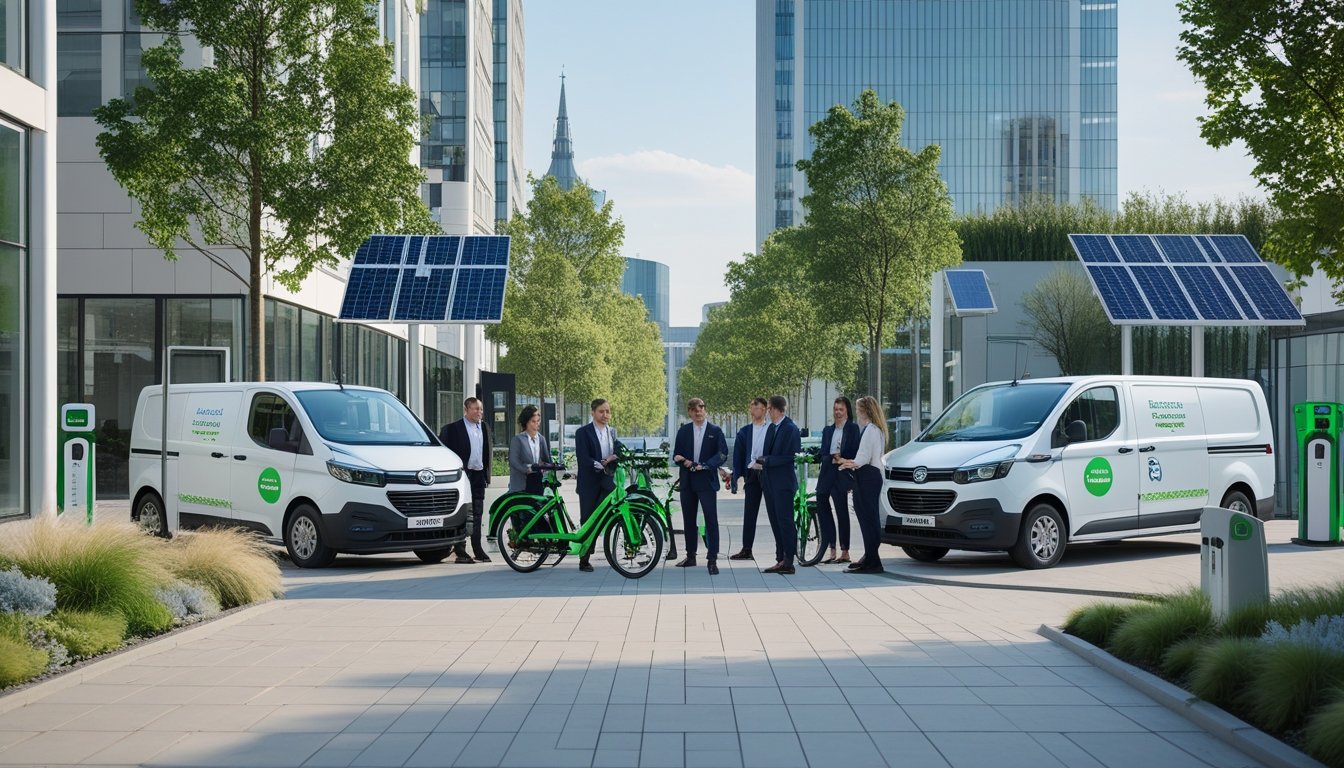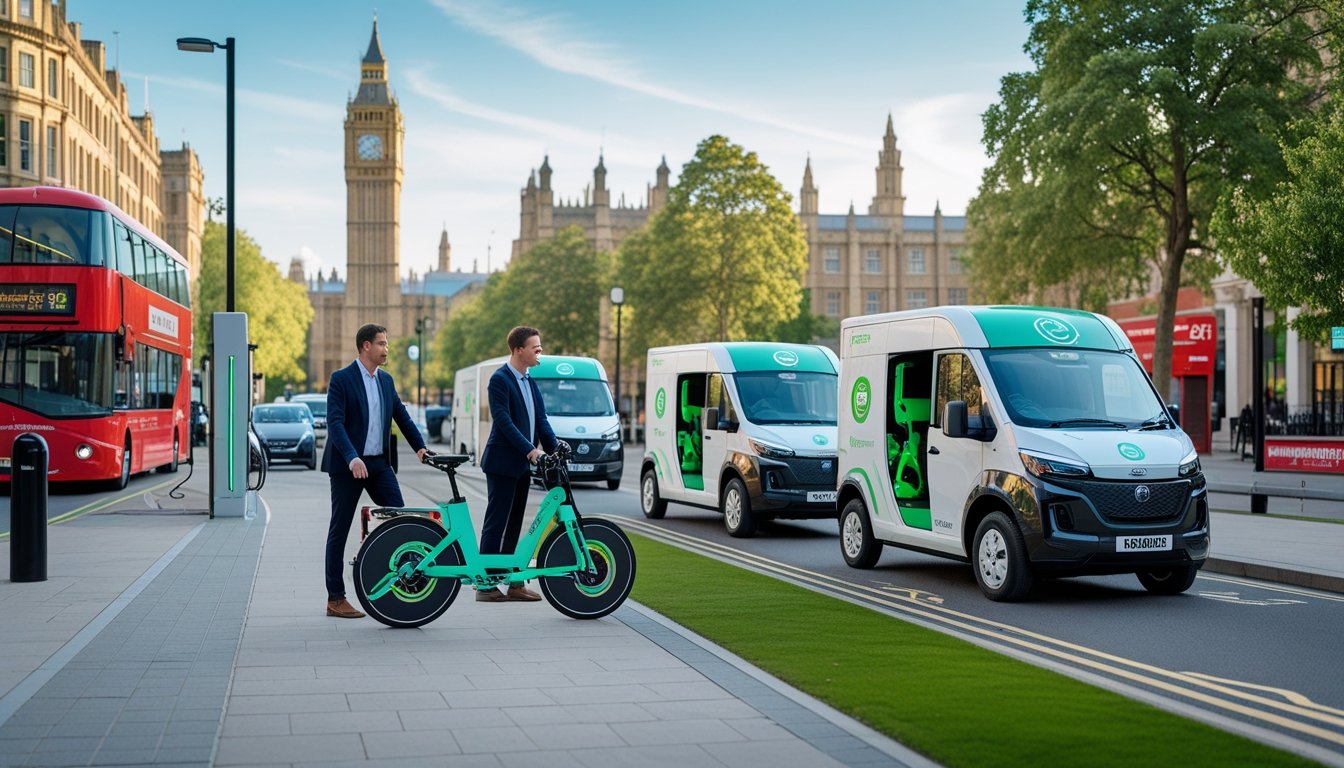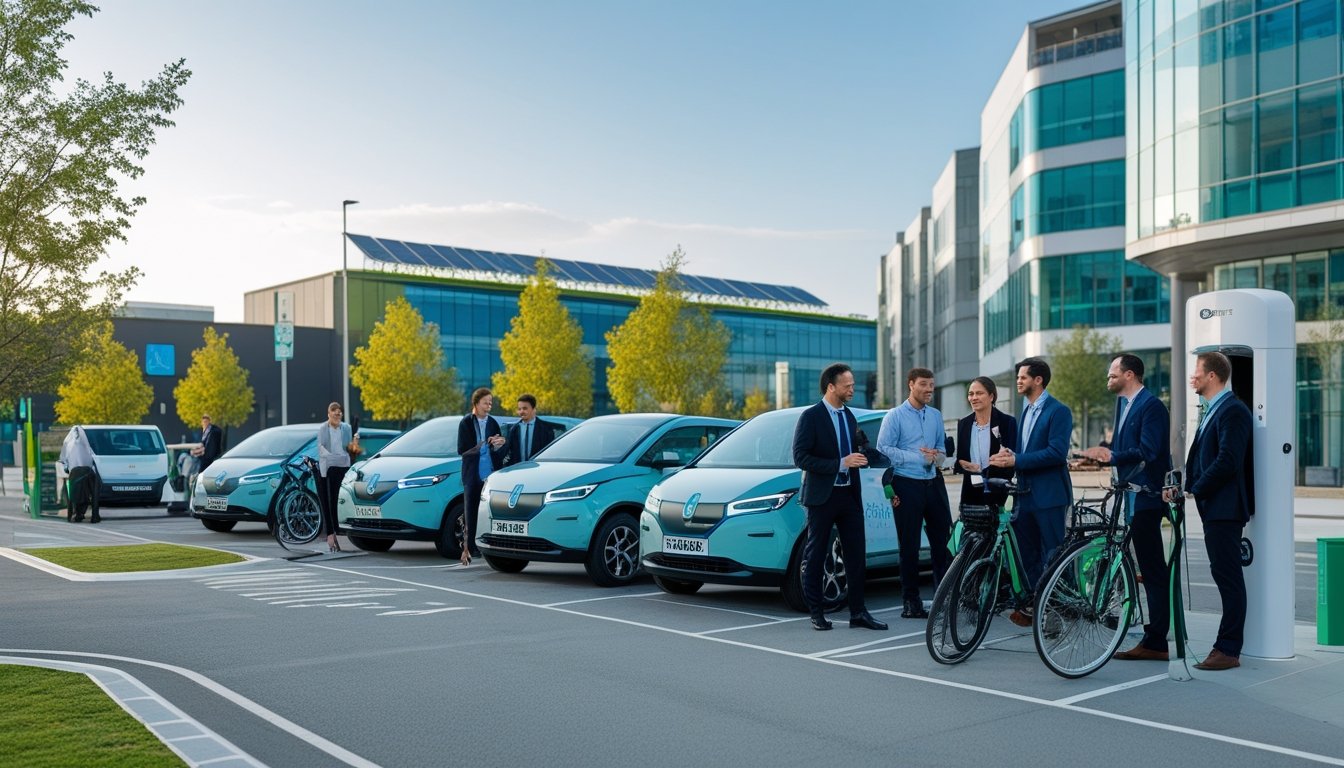Late updated: 20 Oct 2025 15:10
Written by: Amber Collins
Innovative Ideas For Sustainable UK Business Transportation: Future Trends and Solutions
Sustainable business transportation in the UK is an area ripe with innovation and potential. As companies focus on reducing their carbon footprints, the push for eco-friendly and efficient transport solutions is more important than ever. Our exploration of the latest trends reveals that sustainable transport strategies not only benefit the environment but also enhance business efficiency.

As urban areas expand and pressure mounts to curtail emissions, UK businesses are at the forefront of adopting innovative solutions. The convergence of technology and sustainability has led to the development of smart systems that redefine how businesses approach transportation. By integrating advanced technologies and intelligent systems, these innovations promise to make a lasting impact on how we navigate urban and rural landscapes.
Key catalysts driving these changes include government initiatives and industry collaboration aimed at fostering an ecosystem of sustainability. For businesses navigating this landscape, opportunities to embrace efficient transport strategies are abundant, paving the way for lower costs and increased competitiveness. These transformative shifts could significantly alter traditional business models and offer a pathway to a more sustainable future.
Key Takeaways
- Sustainable business transport is crucial for environmental and operational benefits.
- New technologies and smart systems are transforming UK business transport.
- Business strategies are being reshaped by government and industry collaboration.
Key Strategies For Sustainable Business Transport In The UK

Improving business transport sustainability in the UK involves exploring innovative approaches that reduce emissions. Our focus includes transitioning to lower emission fleets, promoting shared mobility, adopting digital solutions, and capitalising on available grants for green initiatives.
Transitioning To Low And Zero Emission Fleets
Transitioning our fleets to low and zero-emission vehicles significantly reduces greenhouse gas emissions. Electric vehicles (EVs) and hybrids are becoming essential investments for businesses. Charging infrastructure is crucial, with government incentives available to assist with costs. The UK's commitment to phasing out petrol and diesel cars by 2035 aligns with these efforts.
Businesses must assess their fleet requirements to identify which vehicles can be replaced or upgraded. In addition, offering training to fleet managers and drivers will maximise the efficiency of new technologies. As we transition, we can expect considerable cost savings in fuel and maintenance, further justifying the investment.
Promoting Public Transport And Shared Mobility
Incorporating public transit and shared mobility into business travel reduces emissions and traffic congestion. Encouraging employees to use public transport or car-sharing services is key. Incentives such as travel allowances for public transport tickets can motivate this shift. Additionally, businesses can provide facilities like bike racks and showers to support cycling.
Working with local councils to improve connectivity can also benefit the workforce. Developing partnerships with transport providers may include discounted rates for employees. These strategies not only cut carbon footprints but also foster a company culture of sustainability.
Adopting Digital Solutions For Efficient Transport
Leveraging digital technologies can streamline transport operations. Implementing route optimisation software aids in reducing fuel consumption and transit times. Telematics systems provide real-time data, assisting in better fleet management. These tools improve overall transport efficiency, minimising unnecessary journeys.
Embracing smart logistics solutions enhances coordination between supply chain partners, improving delivery efficiency. Furthermore, digital platforms for ride-sharing and scheduling can be integrated into company policies. By adopting these technologies, we're aligning with modernisation trends in the UK transport sector.
Leveraging Grants And Incentives For Green Initiatives
There are various grants and incentives available in the UK to support sustainable transport initiatives. Government schemes provide financial assistance for businesses investing in green transport solutions. Low or zero-interest loans can fund the purchase of electric vehicles or the installation of charging stations.
Staying informed about these opportunities is essential for optimising our sustainability strategies. Engaging with industry networks and governmental bodies can provide valuable insights and advice. By utilising these resources, businesses can significantly offset the costs of going green, making sustainable transitions more financially viable.
Innovative Approaches And Technologies Transforming UK Business Transport
In the UK, the evolving landscape of business transport is influenced by groundbreaking technologies and methods. Intelligent mobility, enhanced connectivity, and sustainable practices are reshaping the industry's foundation. Each aspect offers unique advancements that streamline efficiency and address environmental considerations.
Intelligent Mobility Platforms And Automation
Intelligent mobility platforms are revolutionising how businesses move goods and services. By harnessing the power of automation, companies can optimise route planning and fleet management. Automation technologies, such as autonomous vehicles and drones, are becoming integral. They improve delivery times and reduce operational costs.
Moreover, data-driven platforms enable real-time tracking and predictive analytics. This ensures smoother logistics operations. Companies now make informed decisions by analysing traffic patterns and demand fluctuations. The introduction of connectivity through IoT devices further enhances these platforms. This integration fosters a seamless transition to smarter transport systems.
Supporting Connectivity And Access For All
Connectivity is a cornerstone in modern transport innovation. Our approach to business transport emphasises increased access for all sectors. Digital infrastructure improvements foster better transport system integration. High-speed internet and advanced communication networks make connectivity possible across urban and rural environments. This universal access is critical for seamless operations.
Efforts to enhance transport honesty ensure equitable access in underserved areas. Our focus on bridging digital divides strengthens community links. By prioritising accessibility, businesses can tap into new markets and talent pools. Collective benefits are significant, ranging from boosted trade to enriched local economies.
Integrating Sustainable Solutions Across Sectors
Sustainability is at the heart of transforming business transport in the UK. Industries are adopting eco-friendly practices and technologies to minimise environmental impact. Electric vehicles (EVs) and renewable energy sources are leading this transition. These technologies not only cut emissions but also promote energy independence.
Incorporating sustainable methods extends beyond vehicles to supply chain logistics. Companies now commit to greener packaging and waste reduction programmes. The emphasis on sustainable solutions fosters responsible business practices. As a result, we witness the integration of environmental considerations across entire sectors.
Frequently Asked Questions

In UK business transportation, reducing carbon emissions, leveraging advanced technology, and adopting green solutions are vital components of sustainable practices. Understanding incentives, supply chain structuring, and the impact of electric vehicle advancements are critical for businesses.
What are the leading strategies for reducing carbon emissions in business logistics?
Revamping logistics to incorporate electric vehicles and eco-friendly fuels significantly curtails emissions. Businesses are also adopting energy-efficient practices, such as optimising routes and cutting down idle time, to further reduce their carbon footprint.
How can UK businesses leverage technology to enhance eco-friendly transportation?
By integrating smart mobility solutions and data analytics, organisations can optimise transport networks and streamline operations. Real-time monitoring systems offer insights for reducing emissions and maximising efficiency, enabling firms to maintain a competitive edge while being sustainable.
What incentives are available for UK companies adopting green transport solutions?
The UK government offers various incentives, including grants for electric vehicle purchases, tax rebates, and subsidies for infrastructure development. These programmes aim to accelerate the adoption of sustainable transport technologies and reduce barriers for businesses.
In what ways are businesses structuring their supply chains to minimise environmental impact?
Companies are localising suppliers to shorten logistics routes and reduce emissions. Implementing environmentally friendly packaging and optimising inventory through just-in-time strategies are additional methods businesses use to lower their environmental imprint.
What role does employee commuting play in a sustainable transportation strategy?
Encouraging carpooling, providing subsidies for public transport, and implementing flexible working hours can reduce personal vehicle usage. Promoting remote work options also plays a crucial role in decreasing the overall commuter carbon footprint.
How are advancements in electric vehicle technology impacting fleet management for UK businesses?
Enhanced battery life and faster charging times have made electric vehicles more viable for business fleets. This shift allows companies to reduce fuel costs and emissions while capitalising on favourable government schemes supporting eco-friendly fleet upgrades.
